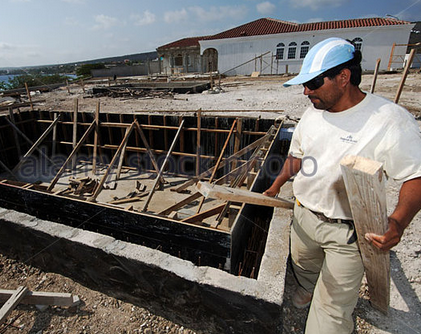I’m fluent in Spanish, but still had to learn the language of social communication
As a lifelong real estate developer, my career began on the job site as a carpenter, evolved through business education into project management, and eventually running the company. Nowadays I am as good with spreadsheets, computers and paperwork as I was back in the day with a nail gun and a Skilsaw.
gun and a Skilsaw.
My career, even from construction job site to air-conditioned office, had always been in the context of what I call the “construction culture”: a frank, blue-collar work ethic with a focus on getting the job done.
I’ve always been good at that, getting things done.
In recent years, I had the opportunity to apply my lifelong education in project management and administration in Ecuador. I joined a construction firm as a financial partner in late 2012, and I was promoted to president in 2014 — it’s why we moved to Guayaquil from the U.S. that year.
Immediately, I focused on improving operational efficiency. This had always brought me success. Unfortunately, things didn’t go as I expected. Not because the company floundered, it has not.
I floundered.
I began to clash with the Hispanic culture that I thought I knew well — my own.
The delicacy of discourse
It all began with email, as many conflicts do. I have the habit of waking up

In the Hispanic culture, effective communication works differently than in North America.
very early and firing off a dozen or more emails with clarification, instruction or questions for my colleagues. To ensure clarity and precision, my correspondence is often terse and direct. I’m organizing the project, and hence I focus on accomplishments. I have no compunction asking for what’s needed with direct instructions and calling a guy out for screwing up. I am not embarrassed to admit my own mistakes, so I expect the same in return. It’s all about the job — not the personalities, right?
If you’re hard-nosed, and from the U.S., you likely agree.
Within a few weeks of assuming my new roll in Ecuador, I was thoroughly hated. Nobody responded to my leadership. And even my partners began talking about removing me from my position.
A lesson learned
In fact, they fired me — for about a month. It became evident that I was needed, but at the same time, I had to figure out how to get along.
This was very difficult for me, having gotten used to the work-focused culture of the United States. Here in Ecuador, the culture is all about social mechanics. It’s a world in which personalities matter. Where the ends do not justify the means. The manner of speech is more important than the substance. It’s a little like marriage, where “tone” alone will get you trouble. And charisma will get you farther than competence.
This is a very difficult cultural shift for anyone with a gringo business background. I had little confidence I could master the niceties needed, but I had a secret weapon to draw on — my childhood. In Spanish, my native language, it’s disrespectful to “get to the point.” One implies it, and assumes the one listing has the intelligence and subtly to understand — without forcing the speaker to just come out and say it.
There exist two forms of address, one for friends and family, the other for formal relationships. The formal language of “usted” is not only a pronoun, but also implies a manner of speech couched in hyper-polite phrasing and false deference that make Spanish language business meetings maddeningly long and inefficient. Having been spanked into learning this form of proper address as a child, I realized I could dig deep and find it in me to adopt.
Making amends
I called a coworker with whom I had recently had a conflict. When I spoke with him in the highly inflected manner reserved for addressing Spanish nobility, the tone not only softened, and warmed our colloquy, but soon resolved the essential conflict. He gave in. He hadn’t objected to my direction, he objected to my style.
Next, I approached the partner that wanted me fired. A man with whom I had an important commonality: We disliked each other intensely. Nonetheless, I began the conversation with unusual sweetness, taking my time, getting to the point, only so slowly. I could tell he was annoyed at my indirect approach, but he also appreciated my attempt to improve the relationship. We finally got to the point after all the niceties were done, and we did get down and dirty, acknowledging what bothered us about each other — it was not pretty. But in the end, me we made a pact. I continue to strive to be polite, he now strives to be responsive. We have worked together better and better ever since.
No longer lost in translation
Nowadays I begin all my email correspondence with an effusive salutation, as if I were writing letters in the 18th century: “Dearest so and so, I hope this brief memo finds you in good spirits and excellent health. I write to wish you well and ask about my shipment of widgets, which I thought — and I readily admit, I most likely misunderstood — were scheduled to arrive two weeks ago. Please forgive my confusion and help me to rectify it by kindly clarifying the date I should expect my widgets. It’s always a pleasure doing business with you, I bid farewell with the deepest respect and my warmest regards, Fernando.”
I hate this sort of thing, and it takes me a lot longer to fire off my morning missives. It’s faster to say, “Where are my damned widgets? They are two weeks overdue!!!” But since every plea for widgets in Ecuador requires interacting with a highly sensitive personality, it’s important to learn the nuances of genteel culture. The results have been remarkable. Within a few short weeks I found folks that had once detested me going out of their way to help me. I can say without doubt that my employees like and most importantly, respect me. It’s one of the hardest adjustments I’ve ever had to make. I’m not enjoying it, not entirely, but I have come to appreciate the gentle miracle of sugarcoating.
Marry Poppins was right, in the most delightful way.


















